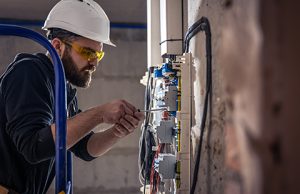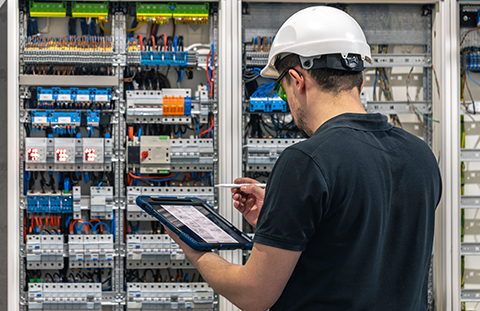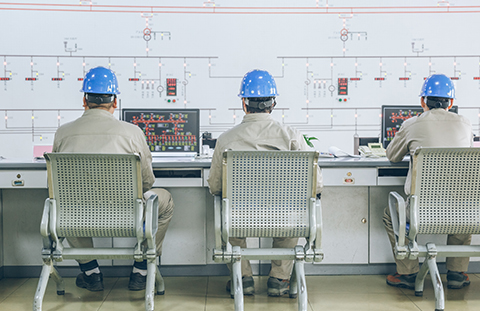Commercial Electrical Inspection Services in Texas
What Is a Commercial Electrical Inspection?
 A commercial electrical inspection is a detailed evaluation of a building’s electrical systems to ensure safety, efficiency, and compliance with regulatory standards. These inspections identify potential hazards, outdated components, and code violations before they lead to costly repairs or disruptions. Whether you’re a business owner, property manager, or facility operator, regular electrical safety inspection services help prevent unexpected failures and ensure long-term system reliability.
A commercial electrical inspection is a detailed evaluation of a building’s electrical systems to ensure safety, efficiency, and compliance with regulatory standards. These inspections identify potential hazards, outdated components, and code violations before they lead to costly repairs or disruptions. Whether you’re a business owner, property manager, or facility operator, regular electrical safety inspection services help prevent unexpected failures and ensure long-term system reliability.
Request FREE Quote
Why Commercial Electrical Inspections Are Critical
Avoid Costly Downtime and Finest
Electrical failures can halt operations, leading to lost revenue and unexpected expenses. A thorough commercial electrical inspection helps businesses avoid costly shutdowns, repairs, and non-compliance penalties by detecting potential issues early. Addressing problems before they escalate reduces financial strain and ensures continued operations.
Protect Employees, Assets, and Operations
Faulty wiring, overloaded circuits, and failing electrical components pose serious risks. Our commercial electrical inspection services help prevent electrical fires, equipment damage, and power failures, keeping your workplace safe for employees and customers. Unchecked electrical issues can compromise machinery, IT systems, and essential business equipment, leading to unexpected disruptions and costly replacements.
Meet OSHA, NEC, and Local Code Standards
Non-compliant electrical systems can lead to code violations, fines, and legal issues. Kissee Inspection Services ensures your electrical infrastructure meets OSHA, NEC (National Electrical Code), and local regulations, keeping your facility up to standard. Businesses must adhere to strict electrical codes, and failing to do so can result in penalties or liability risks in case of accidents.
What’s Included in a Commercial Electrical Inspection?
Key Components We Inspect:
- Wiring, circuits, and distribution panels: Check for wear, improper connections, and capacity issues that could lead to power failures or fire hazards.
- Emergency lighting and backup systems: Verify proper function for safety during outages, ensuring compliance with emergency preparedness regulations.
- Grounding and bonding integrity: Ensure protection against electrical faults to reduce risks of shocks and equipment failures.
- Circuit overload risks: Assess power loads to prevent overheating, short circuits, and system failures.
- Outlets, switches, and equipment safety: Identify defective, loose, or improperly installed components that could lead to electrical malfunctions.
Advanced Tools We Use:
- Thermal imaging for overheating detection: Identify hidden heat buildup that could lead to failures or fires.
- Load testing and arc fault analysis: Assess power stability and detect arc faults before they cause damage, ensuring electrical systems function at peak performance.
Commercial Electrical Inspection Process
Initial Consultation & Assessment
We discuss your facility’s electrical needs, past issues, and compliance concerns. Our team evaluates previous inspection reports, maintenance records, and any known issues to customize our approach for your property.
On-Site Examination
A certified inspector conducts a detailed evaluation using advanced diagnostic tools to assess all key electrical components, from power distribution systems to emergency backups. We ensure minimal disruption to your daily operations while performing a thorough assessment.
Reporting & Recommendations
Following the inspection, we provide a comprehensive report with findings, photos, and actionable recommendations to address any safety concerns, inefficiencies, or code violations. Our reports include clear explanations so businesses can decide on necessary upgrades or repairs.
Common Issues Found in Commercial Electrical Systems
Overloaded Circuits in High-Demand Facilities
Excessive power loads strain electrical systems, causing frequent breaker trips, overheating, and fire hazards. Facilities with heavy machinery, commercial kitchens, or data centers face a higher risk of electrical failures due to increased energy demands.
Corroded Connections or Aging Components
Rust, corrosion, and wear and tear weaken electrical panels, wiring, and safety mechanisms, increasing the risk of short circuits, voltage drops, and complete system failure. Regular electrical safety inspection services extend the lifespan of electrical components and help prevent expensive emergency repairs.
Non-Compliant Emergency Systems
Backup generators, emergency lighting, and fire alarm systems must function properly during an outage. Non-compliant systems create safety risks, operational downtime, and regulatory fines. Our commercial electrical inspection services ensure that emergency electrical systems remain reliable, functional, and up to code.
Why Choose Kissee Inspection Services?
Decades of Industry Experience
With 30+ years in construction and over 15 years in inspections, Kissee Inspection Services provides thorough evaluations, expert recommendations, and dependable service for every client.
Comprehensive, Visual Reports
Our reports include detailed explanations and high-quality images, giving you a full understanding of your electrical system’s condition and any potential hazards. We offer straightforward, actionable recommendations so you can address concerns before they escalate.
A Reputation Built on Integrity
We operate on family values, honesty, and trust to deliver clear, unbiased reports that help clients make informed decisions. Our goal is to provide fair and accurate assessments without unnecessary upselling.
Fair Pricing & Customer Commitment
We believe in transparent service at a fair market rate, helping businesses maintain safe, compliant electrical systems without hidden fees. Our focus remains on delivering value through accurate assessments and expert insights.
FAQs About Commercial Electrical Inspections
How often should I schedule a commercial electrical inspection?
Inspection frequency depends on your facility type and energy demands. Most businesses should schedule annual inspections, while high-demand facilities may require more frequent evaluations. A commercial electrical inspection is also necessary before purchasing a property or after major renovations.






